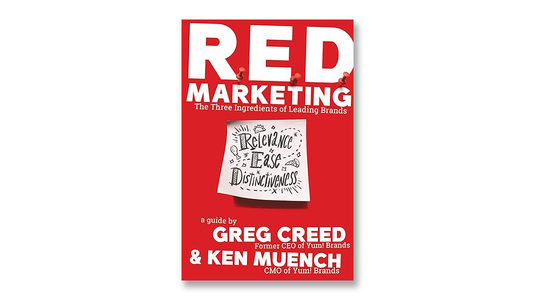

GREG CREED
Former CEO, YUM! Brands
Author: R.E.D. Marketing
Pithy views and provocative perspectives from Greg Creed: Co-Author of R.E.D. Marketing:The Three Ingredients of Leading Brands. The unconventional marketing guru is a former CEO/COO of Yum! Brands and CEO/CMO of Taco Bell (“Think Outside the Bun”). Greg has more than 40 years of extensive experience in marketing and operations with leading packaged goods and restaurant brands. He is co-author of the book R.E.D. Marketing: The Three Ingredients of Leading Brands. Previously, Greg was Chief Executive Officer of Yum! Brands, Inc. from January 2015 to December 2019 and served as a Director of the Board from November 2014 to May 2020. He retired after a successful 25-year career with the Company. Greg now consults and serves on the Board of Directors for Whirlpool Corporation, Aramark Corporation and Delta Air Lines. Greg has recently founded Creed UnCo, an "unconventional" consulting business focused on his three passions: culture and leadership, brand building, and franchising.
Greg Creed joined CMO Council Executive Director Donovan Neale-May for a wide-ranging Zoom conversation on the evolution of branding and why many marketers may have lost the intuitive skills and sensibilities needed to define and sustain the essence of a great brand.
“Your brand has to be relevant. It has to be easy. And it has to be distinctive”
If you can make your brand relevant, easy, and distinctive, then there's a fighting chance you're going to be successful. The reason we created the R.E.D. branding model was that I wanted every marketer in the world to say, do I have a relevance issue? Do I have an ease issue? And do I have a distinctiveness issue? And maybe I have all three? Maybe I have two of the three, and my point was the most important thing was to make sure you were relevant.
I'll give you a good illustration and I'll use Yum! as an example. Pizza Hut and KFC are doing well in the rest of the world, but are struggling a bit in the U.S. Right? They're just not doing as well. I think KFC is distinctive but not as relevant. I think Pizza Hut is relevant, easy, but not distinctive. However, I think Taco Bell is relevant, easy, and distinctive.
When I was CMO and CEO at Taco Bell, we wanted every customer touch point to be distinctive. This even extended to my business card, which was shaped like a sauce packet. It was purple. If you think about every business card in the world, they are white rectangles, and they don't essentially carry the brand essence, right? They are just a white piece of paper. I know kids these days don't even use business cards. So, this is probably an odd example. But my point was that our business card at Taco Bell was distinctive. And I wanted every member of our organization to understand that every touch point had to be distinctive.
I don't think the ability to build brands is as good as it was. I think the ability to execute brands is strong, but I think we're losing the intuitive skill to define and shape a great brand.
For example, at the core of Taco Bell is this essential idea and quality of Mexican Inspired? Everything comes back to being Mexican inspired. Many years ago, one of our summer interns gave me a presentation on why we should add ranch dressing to the Taco Bell menu because ranch dressing sales were taking off in supermarkets and people in the Midwest dunk their pizzas in ranch dressing.
Now, funnily enough, as an Australian. I hate ranch dressing. I just don't like it. So, after this compelling 15 min presentation, I say no, we're not doing it because ranch dressing is not Mexican inspired. Now give them credit, my team went away, came back with Avocado Ranch Dressing, which arguably, is just a bit of a swirl of avocado
What most marketers don't have is a true understanding of the essence of their brand, and so they add things like ranch dressing or Korean barbecue, or whatever the current trend of the moment is. And then they wake up five or 10 years later, and their brand doesn't stand for anything because they've jumped on a trend, or they've jumped on a shift in culture, or whatever. But they haven't done it in a way that ultimately reinforces the essence of their brand.
Think Outside the Box and the Bun
If I go back to Taco Bell again, we had seven years of transactional declines in the late nineties. So, we came up with the tagline, Think Outside the Bun. Why? Because our competition wasn't Del Taco or Chipotle. It was McDonald's. They were the big gorilla and so for 10 years we relentlessly focused on beating McDonald's, even though they're not in our category.
Instead of pretending we're in the Mexican category, I said, no, we're in the “take business off the burger category.” That unconventional approach was how we were able to get back to growth. And that's why we came up with the tagline, Think Outside the Bun, which was a “think outside the box” cultural shift for the entire organization.
“There has to be an emotional connection”
All a functional benefit does is drive you to the category. It’s not the reason you buy the brand. There has to be an emotional connection. I worked at Unilever before I worked at PepsiCo and Yum! and I think a lot of people still get caught up in selling functional benefits. I ran the Dove brand at Unilever for some years. Functionally, the product has a quarter moisturizing cream. It's a great brand, by the way. When I was there, we sold bar soaps. In fact, I actually went to my boss one day and said we need to be called personal wash, not bar soaps, because otherwise we're just bar soaps. We need to make bar soaps a more distinctive personal wash. Now, of course, there are dozens of liquid soaps.
I did not do the Real Women campaign that came way after me. But Dove has a functional benefit. It does have this quarter moisturizing cream. But if you only sold a quarter moisturizing cream and don't sell what they're selling now, which is embracing women for who they are, and not as supermodels, I don't think the brand would be having the success and product diversification that it's had lately.
I think too many marketers also get caught up trying to find a functional benefit when ultimately, I think it's the emotional connection that helps you choose the product. And I think that's because they didn't understand the brand's essence. So that's why I've tried to pride myself on always being unconventional in my approach to branding.
Some marketers are good at sales overnight. Some marketeers are good at brand over time. Very few can do both. And I think this enduring essence is sort of what I think is missing.
I'll give you another example. I met Alan Mulally who used to run Boeing, and then he moved across to run Ford. Now this is a long time ago, and most people born this century won't have a clue who Alan Mulally is. But I met Alan and he had just gone to Ford, and he was telling me about all the challenges facing the Ford brand.
I asked him if he could describe Ford in three words or less. Well, he writes me this long letter, which I'm sure he got from the PR department. This was not three words, I said. Can you describe Ford in three words then, he wrote back? I responded that I could describe Ford in one word: SPIRITED. You think about the Mustang, Bronco, Thunderbird, I said. And every car you make must have spirit. It can't be beige.
I think that most brands these days don't have Spirit Infused, or Mexican Inspired. They do things that are on trend and all the stuff that data suggests. And AI is going to do even more suggestive thinking for them. And it's just going to make everyone boring and beige.
My life is about the unconventional. You cannot be beige. You must be distinctive
When looking at the QSR category, you've got to make sure your food is culturally relevant. You can't be selling yesterday's food to tomorrow's culture. If you think about what defines culture, it's not just food, it's fashion and music and art and all this sort of stuff. In turning around the KFC business in South Africa, we migrated from imagery of a Rainbow Nation coming together by sharing buckets of chicken, to resonating with an empowered, culturally engaged black youth.
We started associating ourselves with breakthrough young black fashion designers, artists, chefs, the whole shooting match. You can probably imagine we didn't change the product, the price, or promotion, the normal stuff you get taught at university.
We just made ourselves relevant in a cultural shift, and the business just took off again. Making sure your brand is culturally relevant is, I think, one of the most important things, particularly in the experiential food business as this is such an essential part of culture.
I'm convinced this is one of the key takeaways from our R.E.D. Marketing book… brands that remain culturally relevant are brands that are selected, successful and sustainable. I would also say in all honesty that KFC has lost its cultural relevance in the U.S. And the products that it is selling are franchise-driven chicken on the bone. That's not how people want to eat chicken these days. They want the experience and menu choices of Raising Cane’s. They sell strips, and they sell bazillions of them.
BOOK: Here is where to order ‘R.E.D Marketing: The Three Ingredients of Leading Brands’
